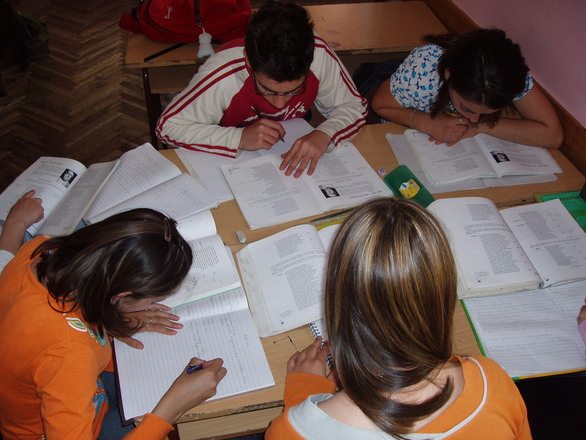Here’s a very interesting story about how Baltimore County Public Schools are changing the way they track and teach students. Liz Bowie of The Baltimore Sun writes, in part:
“‘If you got the golden ticket, you would ride the train from third grade to 12th grade. If you didn’t, then chances are you weren’t going to step onto it later in your academic career,’ said Wade Kerns, the school system’s coordinator of advanced academics. ‘We think instruction needs to be more responsive to the needs of children.’
But a growing chorus of parents and experts are questioning whether the highest achievers are getting what they deserve and need to flourish. They see this as the latest affront, after complaining that gifted students suffered as schools focused on ensuring that the lowest-achieving students passed standardized tests.” It’s a multi-layered article and you’ll definitely want to read the whole thing.
This brings me back to the days when my son was in elementary school and doing really well in his non-GT math class. He asked me to talk to his teacher about moving into GT math and she told me that, yes, he understood the material, but that she only moved up kids who raised their hands to say things like, “Ms. X, what’s another method we could use to solve this problem?” Well, I couldn’t see my son doing that in a million years. I have a feeling that the new method of tracking within small groups in the same classroom wouldn’t have made much of a difference.
(Luckily, once he got to middle school, they were much more open about saying, “Yeah, he gets it. GT for him.” Although it’s almost impossible for that to happen with math because if you’re not in GT in elementary school, you’re at least a year behind.)
What do you think of the changes?


Unfortunately, I think it means all kids get short changed in big classes and heterogenous mixings. With smaller class sizes (18-20), there could be a lot of promise to this kind of fluidity but with 30 kids, teachers just cannot do this. It’s absurd to think this is going to “fix” anything. As the commenter below states, there are many failed studies with on line and blended learning environments. Here’s another link if you want to learn about on line learning and the high costs with terrible results: http://dianeravitch.net/category/k12-inc/
And this is the district Dance came from in Houston, Texas. You have to click through the photos to get to the charts which show increasing rates of kids taking AP tests and decreasing rates of kids passing AP tests. They also show a graph of how they paid for these on line learning initiates- be sure to see the slide that shows experienced teachers decreasing at the same rate as new teachers are increasing…
http://www.chron.com/news/education/article/Grier-out-as-Houston-ISD-superintendent-6496621.php#photo-8609922
Tracking too early does have drawbacks, I think, especially for boys. But the result of this BCPS change is a decimation of GT for many elementary age students. Effectively, there is no true GT, which was supposed to be extra outside-the-box thinking, here and across the nation. The program also has been renamed Advanced Academics or such, but in years past there had been both, one larger grouping, one smaller, both fluid–offering more opportunities for advanced learners and those who advance later— if students were evaluated correctly, not just by an individual teacher (which is key). What is going on now with large, mixed-level classes, known as heterogenous grouping, is that teachers are trying to teach three classes at once. This would make sense in K, or maybe 1st, yet what happens even in those grades: students who are further along often work in groups, to “teach” each other. This will only go so far, so the level of instruction suffers. Enter the push for technology and so-called “personalized learning.” Essentially, as defined under the current trend, this often translates to putting advanced students on computers / online. When highly used, this has definite drawbacks, as one can see by experimental charter school programs detailed in the Washington Post story below, which suffered lagging student test scores, delayed reading abilities, and numerous other failures. As parents of students at various learning levels, we should be watching all of this closely. There must be a more nuanced approach. (I’ve never really… Read more »